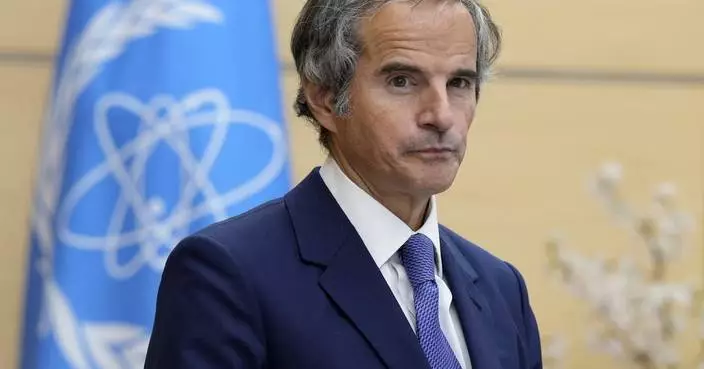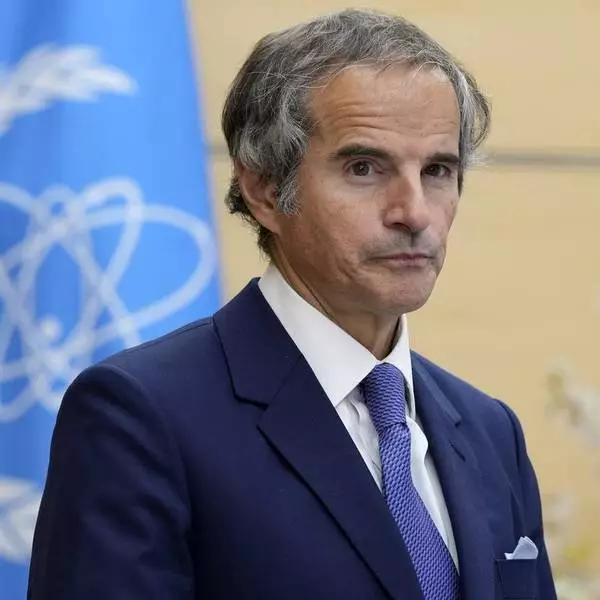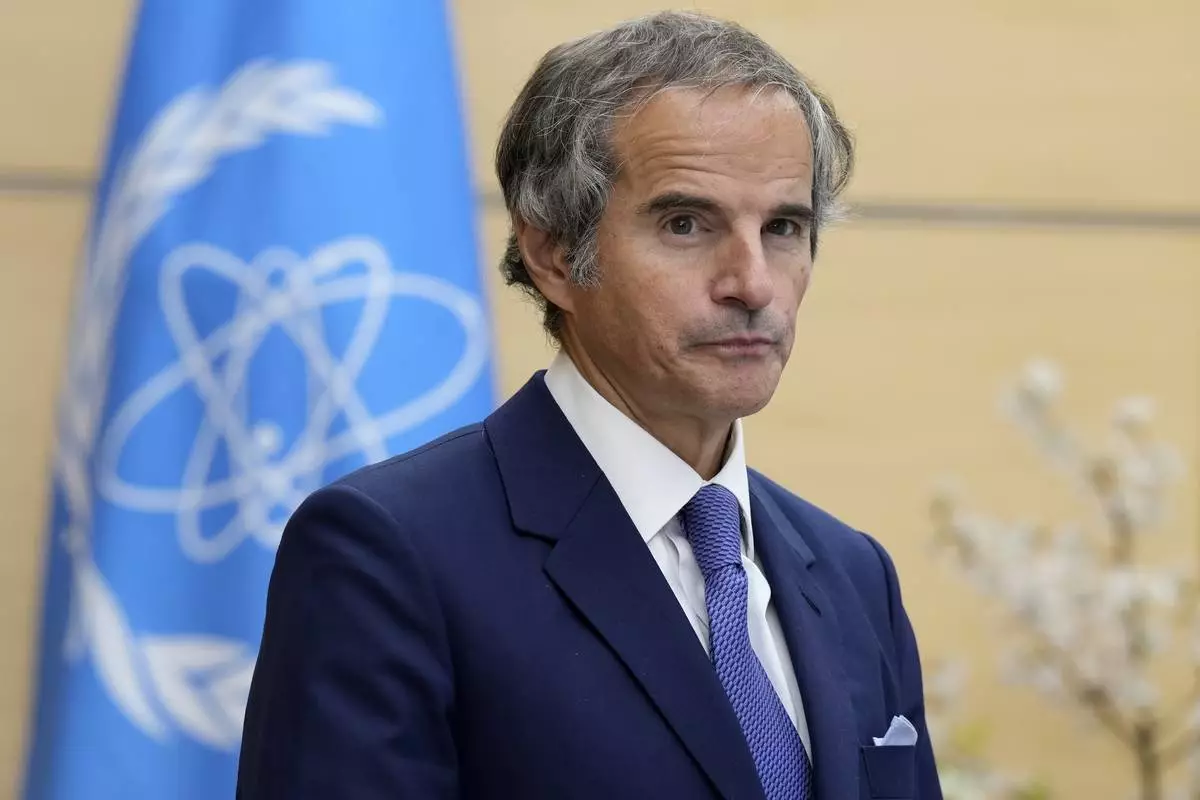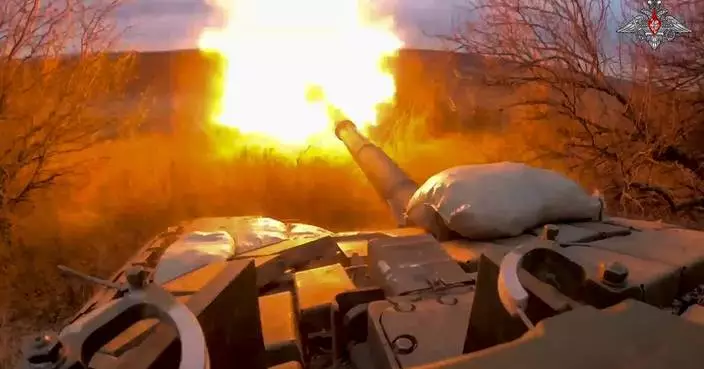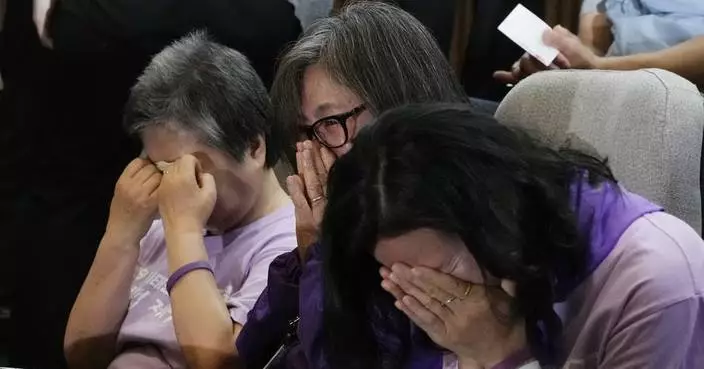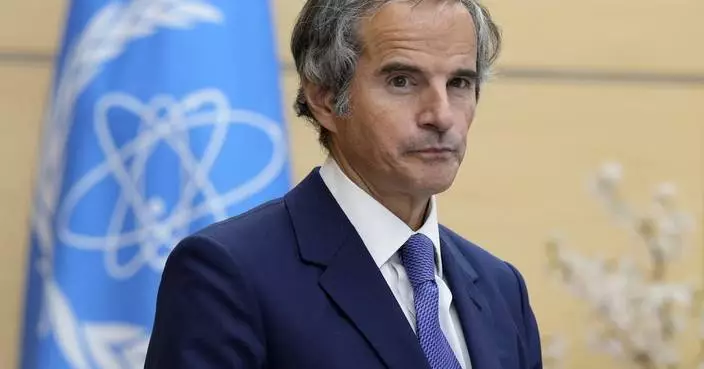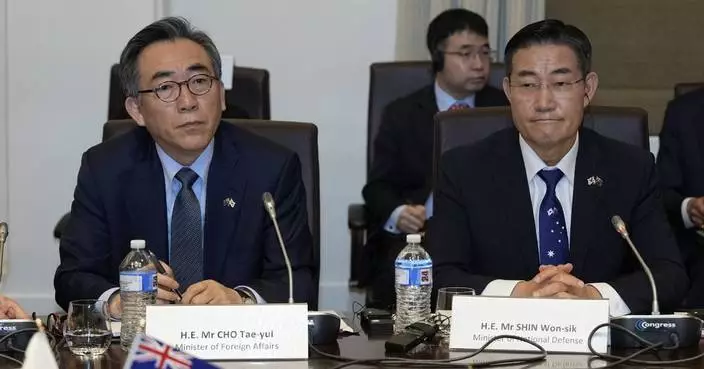North Korean leader Kim Jong Un made good on his promise to demolish his country's nuclear test site, which was formally closed in a series of huge explosions Thursday as a small group of foreign journalists watched.
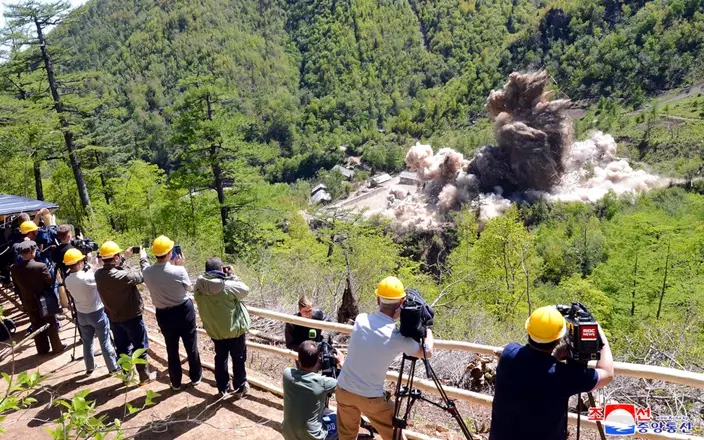
In this Thursday, May 24, 2018 photo provided by the North Korean government, foreign media on a viewing platform watch and record as North Korea’s nuclear test site is blown up at Punggye-ri, North Hamgyong Province, North Korea. The content of this image is as provided and cannot be independently verified. Korean language watermark on image as provided by source reads: "KCNA" which is the abbreviation for Korean Central News Agency. (Korean Central News Agency/Korea News Service via AP)
The explosions at the test site deep in the mountains of the North's sparsely populated northeast were supposed to build confidence ahead of a planned summit next month between Kim and President Donald Trump. But Trump canceled the meeting on Thursday, citing "tremendous anger and open hostility" in a North Korean statement released earlier in the day.
The blasts were centered on three tunnels at the underground site and a number of buildings in the surrounding area. North Korea held a closing ceremony afterward with officials from its nuclear arms program in attendance.
The group of journalists that witnessed the demolition, which touched off landslides near the tunnel entrances and sent up clouds of smoke and dust, included an Associated Press Television crew.
North Korea's state media called the closure of the site part of a process to build "a nuclear-free, peaceful world" and "global nuclear disarmament."
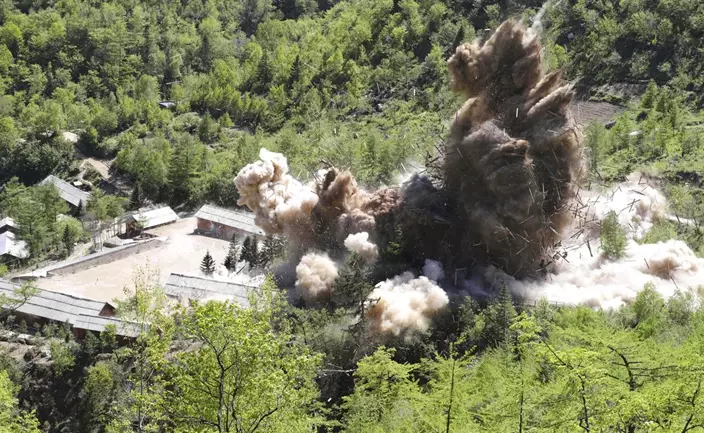
In this Thursday, May 24, 2018 photo, command post facilities of North Korea's nuclear test site are blown up in Punggye-ri, North Korea. (Korea Pool/Yonhap via AP)
"The dismantling of the nuclear test ground conducted with high-level transparency has clearly attested once again to the proactive and peace-loving efforts of the DPRK government being made for assuring peace and stability on the Korean Peninsula and over the world," the North's official news agency reported late Thursday.
North Korea's formal name is the Democratic People's Republic of Korea.
Kim announced his plan to close the site, where North Korea has conducted all six of its underground nuclear tests, ahead of a summit with South Korea's President Moon Jae-in in April and the planned summit with Trump next month.
But even as North Korea made good on its gesture of detente, it lobbed a verbal salvo at Washington, calling Vice President Mike Pence a "political dummy" and saying it is just as ready to meet in a nuclear confrontation as at the negotiating table.
Trump responded by canceling the summit, saying in a letter to Kim, "Sadly, based on the tremendous anger and open hostility displayed in your most recent statement, I feel it is inappropriate, at this time, to have this long-planned meeting."
North Korea's decision to close the Punggye-ri nuclear test site had generally been seen as a welcome gesture by Kim to set a positive tone ahead of the summit. In a statement earlier Thursday, South Korea's National Security Council called the closing the North's "first measure toward complete denuclearization."
Not everyone was as optimistic, however.
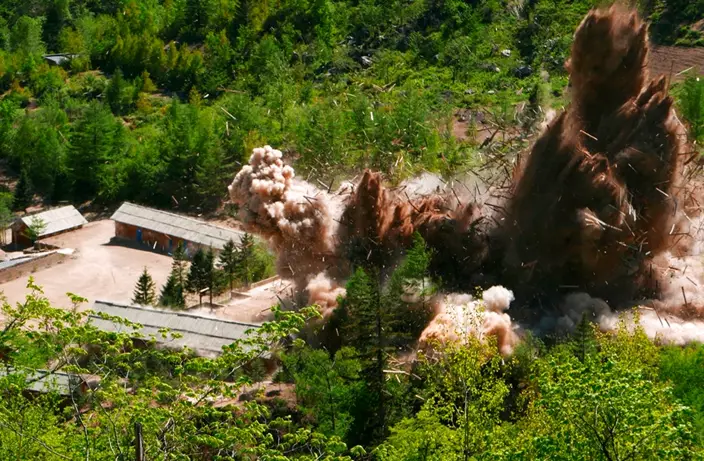
In this Thursday, May 24, 2018 photo, smoke and debris rise in the air as barracks buildings for guards and tunneling workers at North Korea's nuclear test site are blown up at Punggye-ri, North Hamgyong Province, North Korea. (APTN via AP)
The closing of the site is not an irreversible move and would need to be followed by many more significant measures to meet Trump's demand for real denuclearization.
North Korea also did not invite international nuclear weapons inspectors, opting instead for the impact of the television footage to impress the world.
The event was, indeed, impressive.
The first blast the visiting journalists witnessed came at around 11 a.m. after they made a 12-hour plus trip by train and convoy through the night and over bumpy dirt roads. That explosion collapsed the complex's north tunnel, which was used for five nuclear tests between 2009 and last year.
Two other explosions, at around 2:20 p.m. and 4 p.m., collapsed the west and south tunnels, according to officials. North Korea's state media stressed that those two tunnels could have been used to conduct future tests, countering reports the Punggye-ri site had been rendered largely unusable by its earlier tests.
Also blown up were observation posts and barracks used by guards and other workers at the facility. A tunnel on the eastern side had already been shut down after an initial nuclear test in 2006.
North Korea said the demolition did not cause any leakage of radioactive materials or have any "adverse impact on the surrounding ecological environment."
The journalists were allowed to stay at the site for about nine hours.
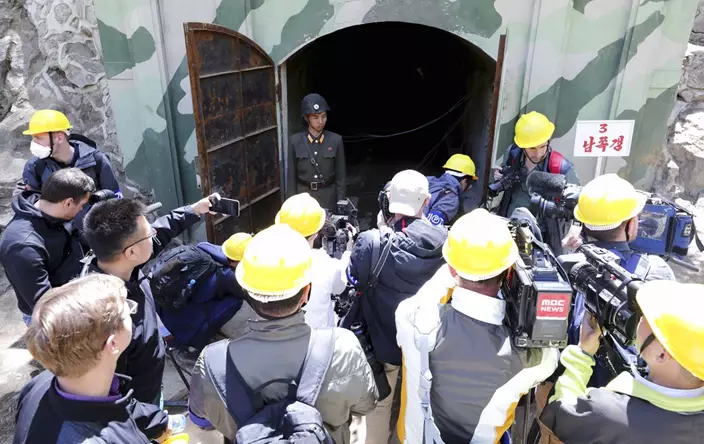
In this Thursday, May 24, 2018 photo, a North Korean soldier stands in front of the south tunnel before explosion as members of foreign media stand at North Korea's nuclear test site in Punggye-ri, North Korea. (Korea Pool/Yonhap via AP)
Getting to the remote site required an overnight train ride from Wonsan, a port city east of the capital, Pyongyang. In typically secretive fashion, officials instructed the media not to open the blinds that covered the windows of their train cars. They also were not allowed to shoot photos from the vehicles they took to the site from the nearest train station, about 20 kilometers (12 miles) away.
Back in Pyongyang, the outburst directed at Pence, issued in the name of a top Foreign Ministry official, came on the heels of another sharp rebuke of Trump's newly appointed national security adviser, John Bolton, and raised concerns that a major gap had opened between the two sides.
Choe Son Hui, a vice minister of foreign affairs, was quoted by the state-run news agency as slamming "ignorant" and "stupid" comments Pence made in an interview with Fox News that compared nuclear-capable North Korea to Libya. Libya gave up its nuclear program at an early stage only to see its longtime dictator overthrown and brutally killed years later.
The summit plan had hit a number of speed bumps recently as both sides began trading barbs and taking tougher positions.
Trump met with South Korean President Moon at the White House on Tuesday for consultations, and suggested then the summit could be delayed or called off entirely.
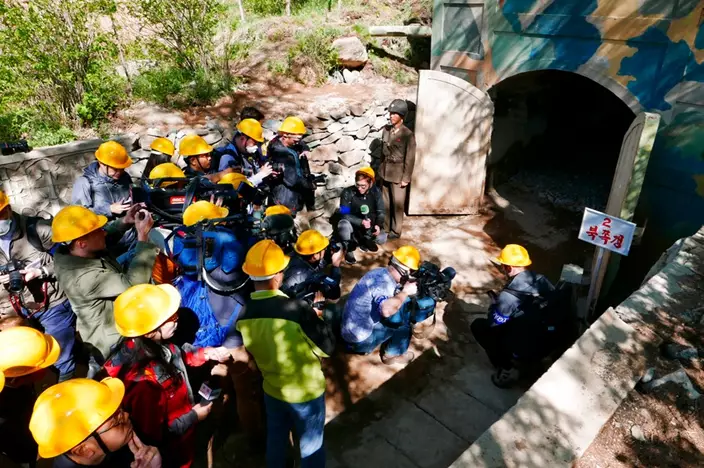
In this Thursday, May 24, 2018 photo, foreign media crowd the entrance of north tunnel at North Korea's nuclear test site during a visit to see a demonstration of its dismantling at Punggye-ri, North Hamgyong Province, North Korea. (APTN via AP)
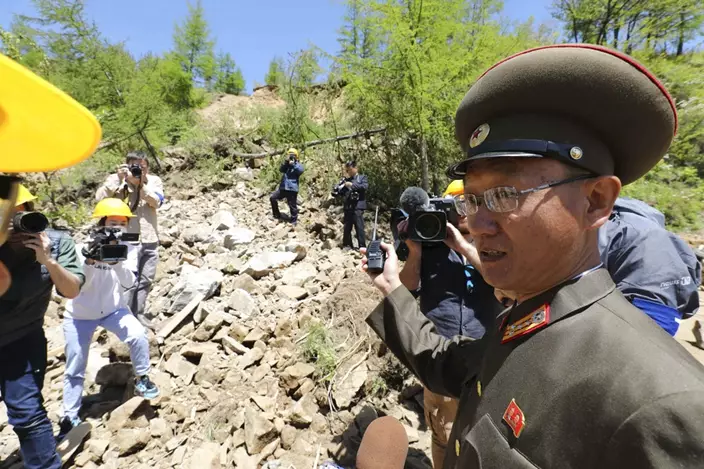
In this Thursday, May 24, 2018 photo, a North Korean official speaks as members of foreign media film on rubble after explosion at North Korea's nuclear test site in Punggye-ri, North Korea. North Korean leader Kim Jong Un made good on his promise to demolish his country's nuclear test site, which was formally closed in a series of huge explosions Thursday as a group of foreign journalists looked on. (Korea Pool/Yonhap via AP)
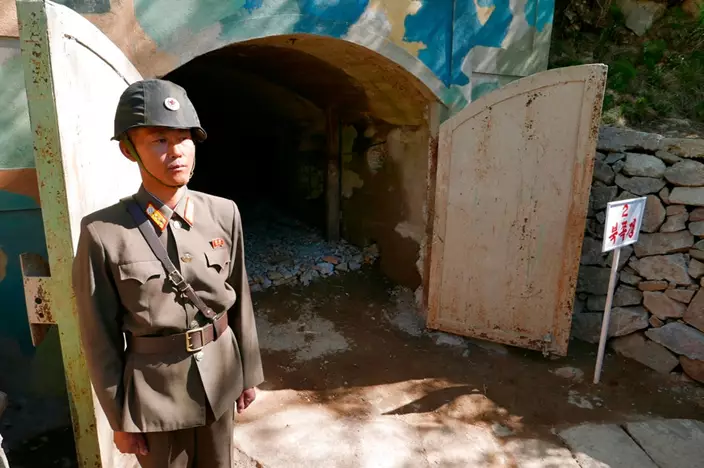
In this Thursday May 24, 2018 photo, a guard stands at the entrance of the north tunnel at North Korea's nuclear test site, which was blown up soon after this photo was made, in a display of dismantling the test site, at Punggye-ri, North Hamgyong Province, North Korea. (APTN via AP)
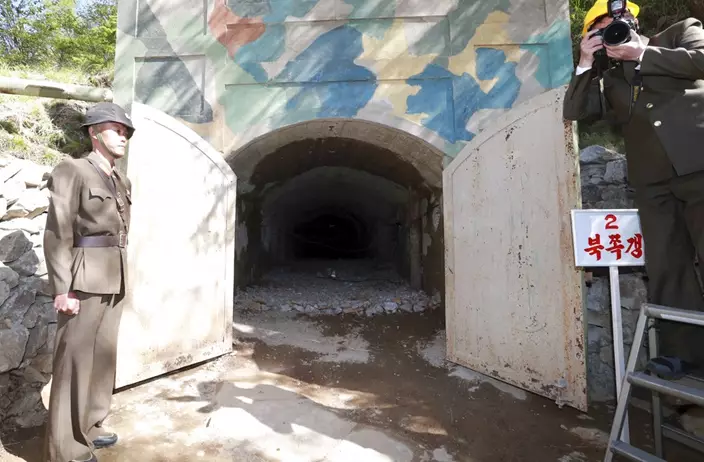
In this Thursday, May 24, 2018 photo, a North Korean soldier, left, stands in front of the north tunnel before explosion at North Korea's nuclear test site in Punggye-ri, North Korea. North Korean leader Kim Jong Un made good on his promise to demolish his country's nuclear test site, which was formally closed in a series of huge explosions Thursday as a group of foreign journalists looked on. (Korea Pool/Yonhap via AP)
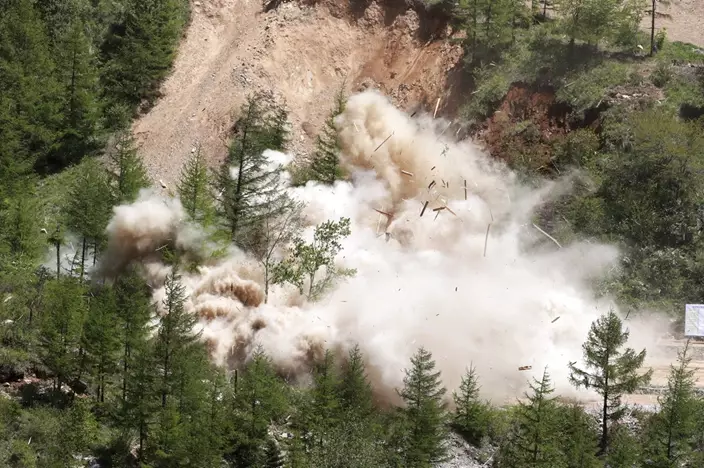
In this Thursday, May 24, 2018 photo, smoke rises from North Korea's nuclear test site after an explosion in Punggye-ri, North Korea. North Korean leader Kim Jong Un made good on his promise to demolish his country's nuclear test site, which was formally closed in a series of huge explosions Thursday as a group of foreign journalists looked on. (Korea Pool/Yonhap via AP)
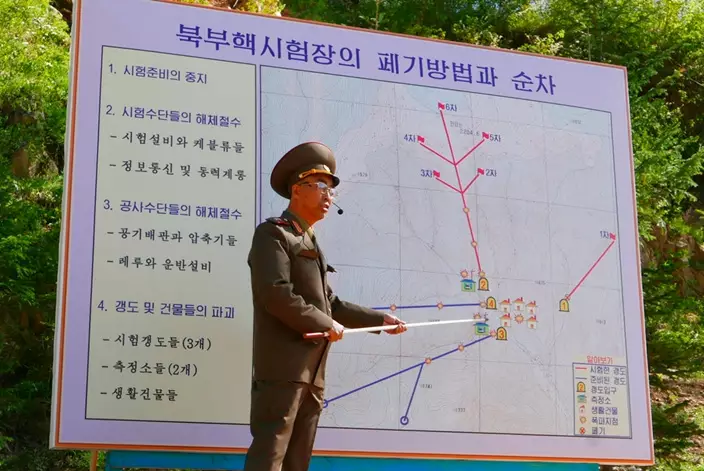
In this Thursday, May 24, 2018 photo, Deputy Director of North Korea's Nuclear Weapons Institute, who would not give his name, briefs reporters about the dismantling of North Korea's nuclear test site, at Punggye-ri, North Hamgyong Province, North Korea. (APTN via AP)



